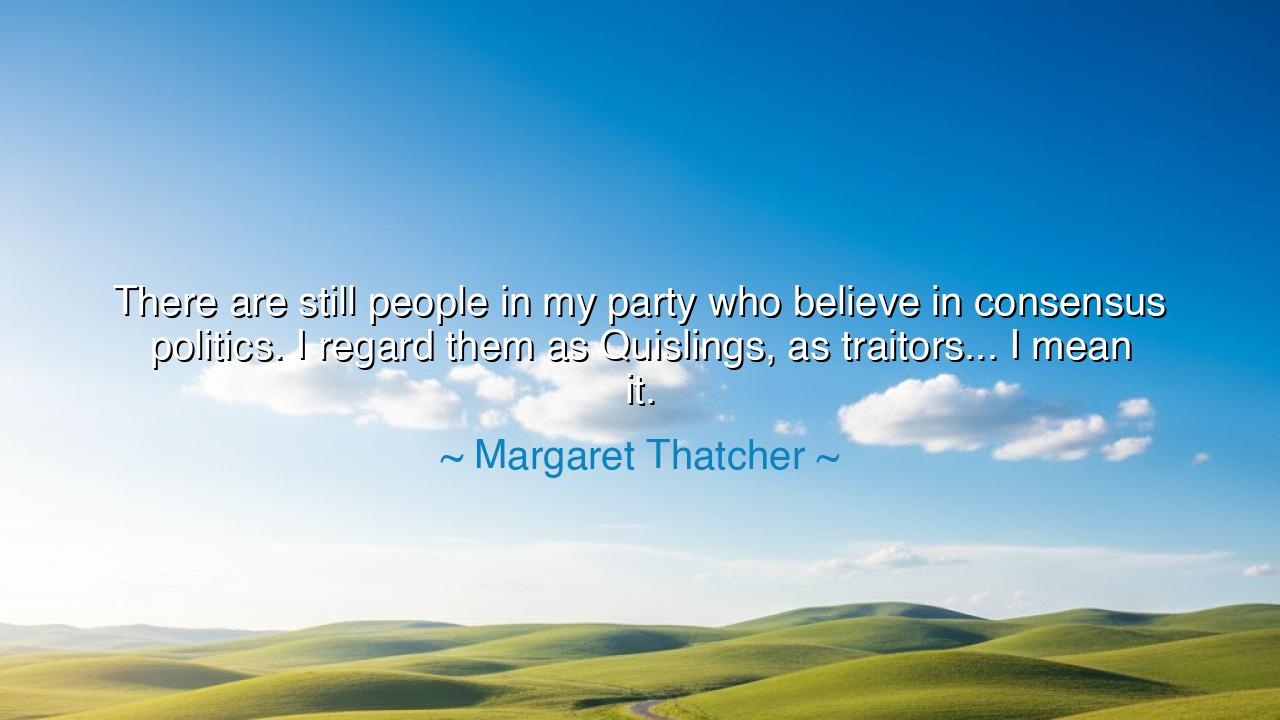
There are still people in my party who believe in consensus
There are still people in my party who believe in consensus politics. I regard them as Quislings, as traitors... I mean it.






The words of Margaret Thatcher — “There are still people in my party who believe in consensus politics. I regard them as Quislings, as traitors… I mean it.” — thunder with the voice of defiance and unwavering will. She declares that consensus politics, so often praised as compromise and harmony, is in truth a mask for weakness, a surrender of principle for comfort. By naming such men Quislings, she invokes the image of betrayal, recalling Vidkun Quisling, the infamous collaborator with the Nazis in Norway. To Thatcher, those who bowed before consensus were not allies but traitors to conviction.
The meaning of her words lies in her belief that leadership must be forged in clarity, not muddled by appeasement. In the heat of politics, she saw consensus not as virtue, but as decay — the slow erosion of ideals until nothing remained but hollow agreement. For her, to stand firm was to guard the flame of principle, while to compromise endlessly was to extinguish it. Thus, her fury was not against opponents alone, but against those within her own ranks who lacked the courage of conviction.
History offers a vivid parallel. Recall the policy of appeasement before the Second World War, when Britain and France sought consensus with Hitler, feeding him territory in hopes of peace. That false consensus brought only greater ruin, proving Thatcher’s point: to sacrifice principle for comfort is not peace but betrayal. Just as Churchill condemned appeasement as dishonor, Thatcher condemned consensus politics as treason to her vision of a stronger, freer Britain.
The origin of this fiery declaration rests in Thatcher’s own rule, marked by unyielding reforms and fierce resistance to compromise. She was known as the “Iron Lady,” not for cruelty, but for her refusal to bend when she believed truth and necessity demanded strength. In calling her party members Quislings, she drew upon the ancient tradition of leaders who warned their people that disunity and cowardice within are more dangerous than enemies without.
Therefore, O seekers of wisdom, learn from her severity: there are times when consensus is wise, and times when it is ruin. To compromise on trivial matters may keep the peace, but to yield on matters of principle is to betray the very soul of a people. As Thatcher teaches, leadership demands the courage to stand firm when all around you cry for surrender. For though such firmness may divide, it may also save a nation from the slow death of timidity.






THThuy Hong
Margaret Thatcher’s harsh criticism of those who believed in consensus politics is a powerful reflection of her leadership style. She clearly valued strength and decisiveness over compromise. But what about the long-term consequences of such rigid views? Can a political party or nation truly succeed without ever seeking consensus or cooperation? How does this align with the way politics functions today, where collaboration seems essential for lasting change?
KDLe tran Khanh Du
Thatcher’s comment about consensus politics as ‘treason’ reflects a deeply confrontational approach to leadership. It’s almost as if she viewed compromise as a form of weakness. Was this kind of divisiveness necessary to achieve her political goals, or did it alienate potential allies and hinder meaningful progress? How do we balance the need for strong leadership with the need for cooperation and unity in political decision-making?
THThao Ho
It’s surprising to hear Margaret Thatcher describe consensus politics in such harsh terms, especially considering how important cooperation and compromise are in today’s political climate. Could her lack of tolerance for differing viewpoints have led to missed opportunities for real change? Or was her combative approach precisely what was needed during her tenure? This statement makes me wonder: Can any political movement truly thrive without a degree of consensus or collaboration?
UGUser Google
Thatcher’s comment is startling in its intensity. To label those in her party who believed in consensus politics as ‘Quislings’ feels like a personal attack, not just a political disagreement. Is consensus politics really that dangerous, or was this just a matter of philosophical difference for Thatcher? How does this reflect her leadership style, and how do modern politicians navigate similar divisions without resorting to such extreme rhetoric?
KKKARAOOKE KARAOOKE
Thatcher’s view of consensus politics as a betrayal of her party’s values shows how deeply polarized political ideologies can become. She clearly believed in strong, uncompromising leadership, but can this extreme perspective be effective in the long run? Would the world be better if more leaders adopted her stance, or do we need to prioritize cooperation and dialogue over forceful, one-sided action? It raises the question of how we define ‘true leadership’ in modern politics.